鸦片战争的历史及影响(英语论文)
鸦片战争观后感350字左右
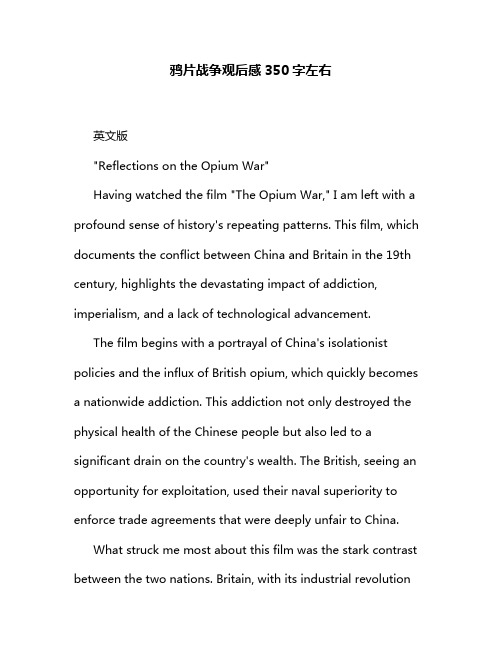
鸦片战争观后感350字左右英文版"Reflections on the Opium War"Having watched the film "The Opium War," I am left with a profound sense of history's repeating patterns. This film, which documents the conflict between China and Britain in the 19th century, highlights the devastating impact of addiction, imperialism, and a lack of technological advancement.The film begins with a portrayal of China's isolationist policies and the influx of British opium, which quickly becomes a nationwide addiction. This addiction not only destroyed the physical health of the Chinese people but also led to a significant drain on the country's wealth. The British, seeing an opportunity for exploitation, used their naval superiority to enforce trade agreements that were deeply unfair to China.What struck me most about this film was the stark contrast between the two nations. Britain, with its industrial revolutionand advanced technology, seemed unstoppable. In contrast, China, with its outdated military and government structure, appeared helpless in the face of this onslaught.The film also highlights the moral dilemmas faced by individual characters. Some chose to resist the British occupation, sacrificing their lives in the process. Others, hoping to preserve some semblance of power, chose to collaborate with the occupiers.In the end, the film leaves the viewer with a sense of sadness and regret. It serves as a reminder that addiction, imperialism, and technological backwardness can have devastating consequences. It also serves as a warning that history has a tendency to repeat itself if we fail to learn from its lessons.中文版“鸦片战争观后感”观看了电影《鸦片战争》后,我深感历史的惊人相似性。
论述鸦片战争的背景及影响
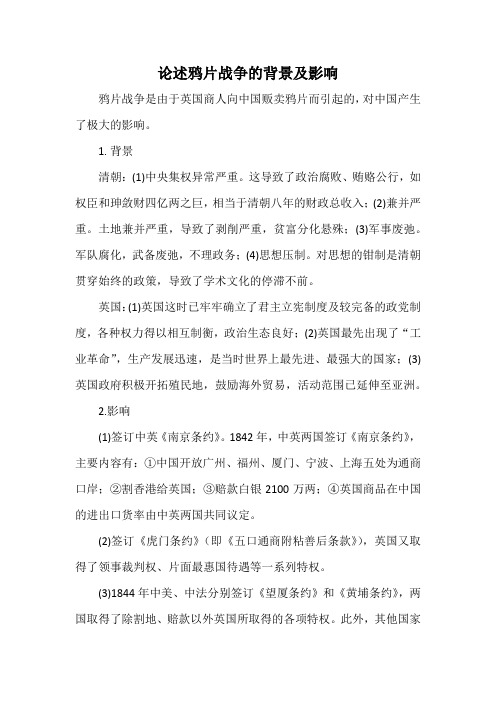
论述鸦片战争的背景及影响
鸦片战争是由于英国商人向中国贩卖鸦片而引起的,对中国产生了极大的影响。
1.背景
清朝:(1)中央集权异常严重。
这导致了政治腐败、贿赂公行,如权臣和珅敛财四亿两之巨,相当于清朝八年的财政总收入;(2)兼并严重。
土地兼并严重,导致了剥削严重,贫富分化悬殊;(3)军事废弛。
军队腐化,武备废弛,不理政务;(4)思想压制。
对思想的钳制是清朝贯穿始终的政策,导致了学术文化的停滞不前。
英国:(1)英国这时已牢牢确立了君主立宪制度及较完备的政党制度,各种权力得以相互制衡,政治生态良好;(2)英国最先出现了“工业革命”,生产发展迅速,是当时世界上最先进、最强大的国家;(3)英国政府积极开拓殖民地,鼓励海外贸易,活动范围已延伸至亚洲。
2.影响
(1)签订中英《南京条约》。
1842年,中英两国签订《南京条约》,主要内容有:①中国开放广州、福州、厦门、宁波、上海五处为通商口岸;②割香港给英国;③赔款白银2100万两;④英国商品在中国的进出口货率由中英两国共同议定。
(2)签订《虎门条约》(即《五口通商附粘善后条款》),英国又取得了领事裁判权、片面最惠国待遇等一系列特权。
(3)1844年中美、中法分别签订《望厦条约》和《黄埔条约》,两国取得了除割地、赔款以外英国所取得的各项特权。
此外,其他国家
也纷纷要求“援例”订约。
(4)沙俄趁机侵占了我国黑龙江的大片领土,势力扩张到了兴衮河和黑龙江下游两岸以及口外整个中国领海,并侵占了库页岛。
此外,沙俄还侵占了中国西北地区的大片领土。
鸦片战争博物馆的英文作文
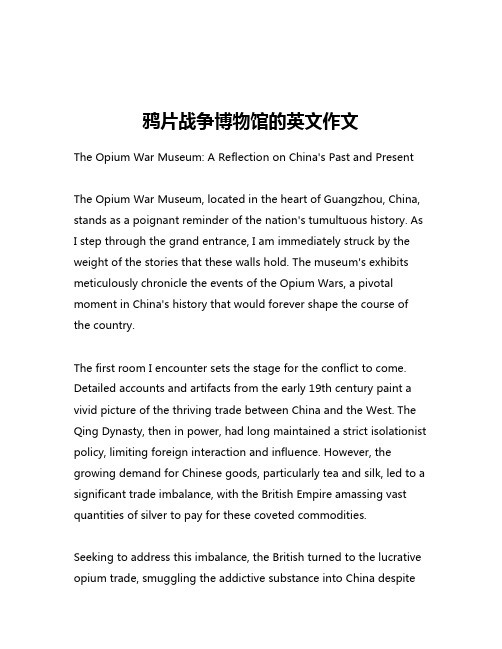
鸦片战争博物馆的英文作文The Opium War Museum: A Reflection on China's Past and PresentThe Opium War Museum, located in the heart of Guangzhou, China, stands as a poignant reminder of the nation's tumultuous history. As I step through the grand entrance, I am immediately struck by the weight of the stories that these walls hold. The museum's exhibits meticulously chronicle the events of the Opium Wars, a pivotal moment in China's history that would forever shape the course of the country.The first room I encounter sets the stage for the conflict to come. Detailed accounts and artifacts from the early 19th century paint a vivid picture of the thriving trade between China and the West. The Qing Dynasty, then in power, had long maintained a strict isolationist policy, limiting foreign interaction and influence. However, the growing demand for Chinese goods, particularly tea and silk, led to a significant trade imbalance, with the British Empire amassing vast quantities of silver to pay for these coveted commodities.Seeking to address this imbalance, the British turned to the lucrative opium trade, smuggling the addictive substance into China despitethe Qing government's attempts to curb its spread. The museum's exhibits meticulously document the escalating tensions, as the Qing officials increasingly cracked down on the opium trade, culminating in the seizure of vast quantities of the drug by the Imperial Commissioner Lin Zexu.The second section of the museum delves into the outbreak of the First Opium War. Visitors are confronted with the stark realities of the conflict, from the overwhelming technological superiority of the British Navy to the devastating impact on the Chinese population. Graphic depictions of the battles, accompanied by personal accounts from soldiers and civilians, paint a harrowing picture of the human toll of the war.As I move through the museum, I am struck by the sheer scale of the devastation inflicted upon China. The unequal treaties that followed the Opium Wars, including the cession of Hong Kong to the British, are presented in stark detail, highlighting the profound humiliation and loss of sovereignty experienced by the Qing Dynasty.The museum's final section examines the long-term consequences of the Opium Wars, tracing the path of China's subsequent modernization and the rise of nationalist sentiments. Artifacts and multimedia displays showcase the country's gradual transformation, from the establishment of the Republic of China to the eventualtriumph of the Communist revolution.Throughout my visit, I am confronted with a range of emotions –anger at the injustices perpetrated against China, sorrow for the countless lives lost, and a deep sense of admiration for the resilience and determination of the Chinese people. The Opium War Museum is not merely a repository of historical facts, but a powerful testament to the enduring spirit of a nation that has overcome immense adversity.As I exit the museum, I find myself reflecting on the lessons of the past and their relevance to the present. The Opium Wars serve as a stark reminder of the dangers of unequal power dynamics, the consequences of economic exploitation, and the importance of national sovereignty. In an era of increasing global interconnectedness, these lessons remain as vital as ever, guiding us towards a more just and equitable world.The Opium War Museum stands as a powerful symbol of China's journey, a testament to the country's resilience and its unwavering commitment to reclaiming its rightful place on the world stage. Through its meticulous curation and thought-provoking exhibits, the museum invites visitors to engage with a complex and pivotal moment in history, ultimately inspiring a deeper understanding of China's past, present, and future.。
关于鸦片战争的英语作文
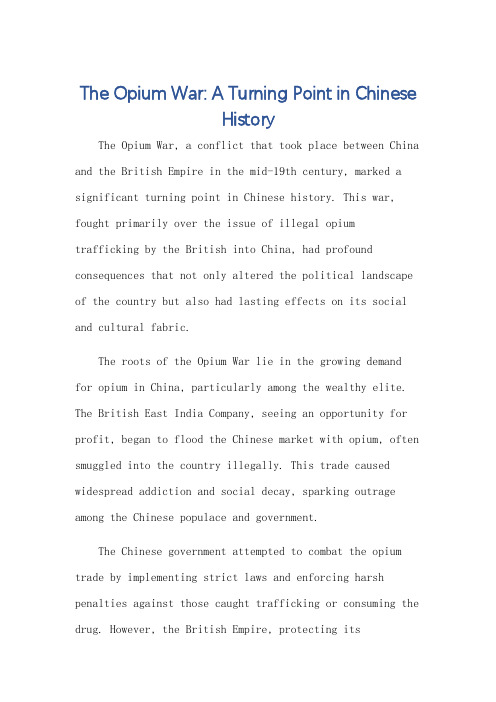
The Opium War: A Turning Point in ChineseHistoryThe Opium War, a conflict that took place between China and the British Empire in the mid-19th century, marked a significant turning point in Chinese history. This war, fought primarily over the issue of illegal opiumtrafficking by the British into China, had profound consequences that not only altered the political landscape of the country but also had lasting effects on its social and cultural fabric.The roots of the Opium War lie in the growing demandfor opium in China, particularly among the wealthy elite. The British East India Company, seeing an opportunity for profit, began to flood the Chinese market with opium, often smuggled into the country illegally. This trade caused widespread addiction and social decay, sparking outrage among the Chinese populace and government.The Chinese government attempted to combat the opium trade by implementing strict laws and enforcing harsh penalties against those caught trafficking or consuming the drug. However, the British Empire, protecting itscommercial interests, refused to cooperate and instead pressed for the legalization of opium trade. This led to a series of diplomatic disputes and escalating tensions between the two powers.In 1840, the British Empire launched a military expedition against China, citing the Chinese government's failure to suppress the opium trade as justification. The Chinese army, despite its numerical advantage, was no match for the superior firepower and military technology of the British forces. The resulting series of battles ended in decisive victories for the British, who forced the Chinese government to sign the Treaty of Nanking.The Treaty of Nanking was a humiliating defeat for China. It stripped the country of its territorial integrity, ceding the strategic Hong Kong Island to the British, and imposed heavy indemnities on the Chinese government. Moreover, it opened several Chinese ports to foreign trade and established extraterritoriality for British subjects in China, effectively denying the Chinese governmentjurisdiction over British citizens within its borders.The Opium War had profound long-term consequences for China. It marked the beginning of a period of foreign influence and interference in Chinese affairs that lasted for decades. The treaty system established by the Opium War opened China's door to Western influence, leading to the influx of foreign goods, ideas, and culture. This, in turn, led to the gradual weakening of traditional Chinese institutions and values.Moreover, the Opium War exposed the technological and military backwardness of the Qing dynasty, sparking a movement for reform and modernization within China. This ultimately led to the establishment of modern industries, the development of a modern army and navy, and the emergence of a more educated and politically aware citizenry.In conclusion, the Opium War stands as a pivotal event in Chinese history. It marked the end of China's isolation from the outside world and the beginning of a period of foreign domination and influence. However, it also served as a catalyst for reform and modernization within China,leading to significant changes in its political, economic, and cultural landscapes.**鸦片战争:中国历史的转折点**鸦片战争是19世纪中叶中国与大英帝国之间爆发的一场冲突,标志着中国历史的重大转折点。
第二次鸦片战争作文
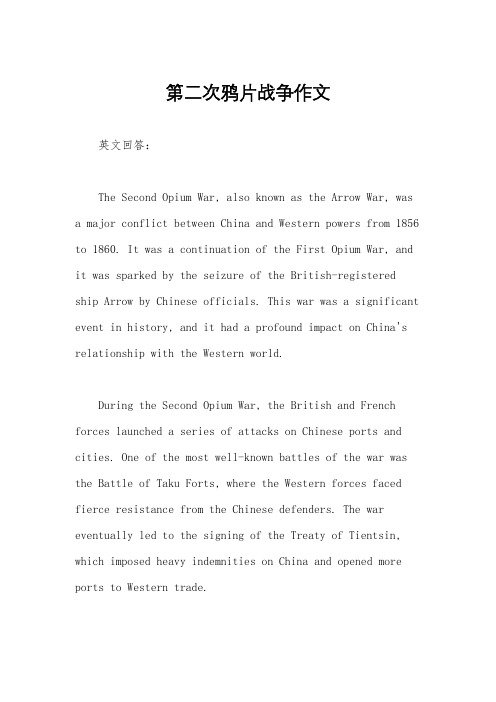
第二次鸦片战争作文英文回答:The Second Opium War, also known as the Arrow War, was a major conflict between China and Western powers from 1856 to 1860. It was a continuation of the First Opium War, and it was sparked by the seizure of the British-registered ship Arrow by Chinese officials. This war was a significant event in history, and it had a profound impact on China's relationship with the Western world.During the Second Opium War, the British and French forces launched a series of attacks on Chinese ports and cities. One of the most well-known battles of the war was the Battle of Taku Forts, where the Western forces faced fierce resistance from the Chinese defenders. The war eventually led to the signing of the Treaty of Tientsin, which imposed heavy indemnities on China and opened more ports to Western trade.The Second Opium War also had a lasting impact on the Chinese society and economy. The defeat in the war further weakened the Qing dynasty and exposed the vulnerabilities of the Chinese military. It also led to the widespread destruction of Chinese infrastructure and the loss of many lives. Additionally, the unequal treaties signed after the war imposed harsh terms on China, leading to further exploitation by Western powers.中文回答:第二次鸦片战争,又称为“箭战”,是从1856年到1860年中国和西方列强之间的一场重大冲突。
描述鸦片战争英文介绍作文

描述鸦片战争英文介绍作文英文,The Opium War, also known as the First Opium War, was a conflict between China and Great Britain from 1839 to 1842. As a result of the war, China ceded the island of Hong Kong to the British and opened up five ports toforeign trade. The war was primarily caused by the British trade of opium to China, which was illegal but highly profitable. 。
The British had been trading opium in China for many years, despite the Chinese government's attempts to ban the drug. The trade imbalance caused by the opium trade led to a shortage of silver in China, as the Chinese were using silver to pay for the opium. This imbalance angered the Chinese government and led to the destruction of British opium stocks in 1839, sparking the conflict.The war itself was fought primarily at sea, with the British navy easily overpowering the Chinese forces. The Treaty of Nanking, signed in 1842, marked the end of thewar and imposed a series of unequal treaties on China. These treaties not only forced China to cede Hong Kong to the British, but also opened up several other ports to British trade and granted extraterritorial rights toBritish citizens in China.The Opium War had a profound impact on China, leading to a period of humiliation and weakness known as the "Century of Humiliation." It also marked the beginning of a series of unequal treaties and foreign interventions in China, which would continue for over a century.中文,鸦片战争,也称第一次鸦片战争,是中国和英国在1839年至1842年之间的一场冲突。
鸦片战争英文作文
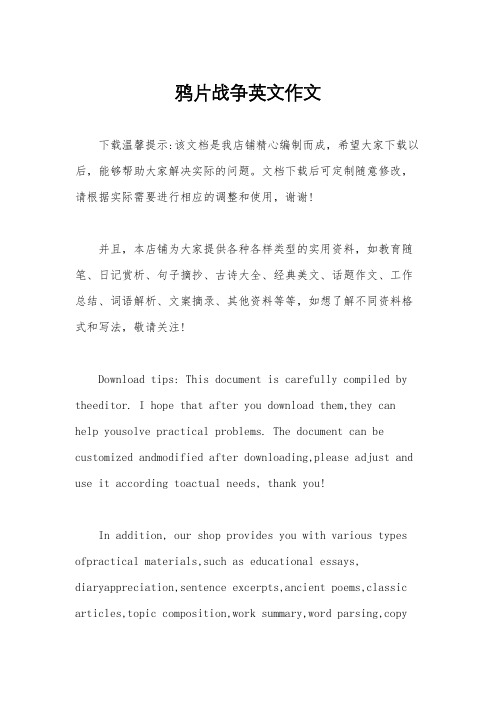
鸦片战争英文作文下载温馨提示:该文档是我店铺精心编制而成,希望大家下载以后,能够帮助大家解决实际的问题。
文档下载后可定制随意修改,请根据实际需要进行相应的调整和使用,谢谢!并且,本店铺为大家提供各种各样类型的实用资料,如教育随笔、日记赏析、句子摘抄、古诗大全、经典美文、话题作文、工作总结、词语解析、文案摘录、其他资料等等,如想了解不同资料格式和写法,敬请关注!Download tips: This document is carefully compiled by theeditor. I hope that after you download them,they can help yousolve practical problems. The document can be customized andmodified after downloading,please adjust and use it according toactual needs, thank you!In addition, our shop provides you with various types ofpractical materials,such as educational essays, diaryappreciation,sentence excerpts,ancient poems,classic articles,topic composition,work summary,word parsing,copyexcerpts,other materials and so on,want to know different data formats andwriting methods,please pay attention!The Opium War was a really bad time for China. A lot of bad stuff happened.The British came and forced opium on us. It was so wrong.Many people suffered because of this war. Families were torn apart.It had a huge impact on China's history. We should never forget this.The war changed everything. It made China face many challenges.We have to learn from this and make sure it never happens again.。
虎门销烟英语作文
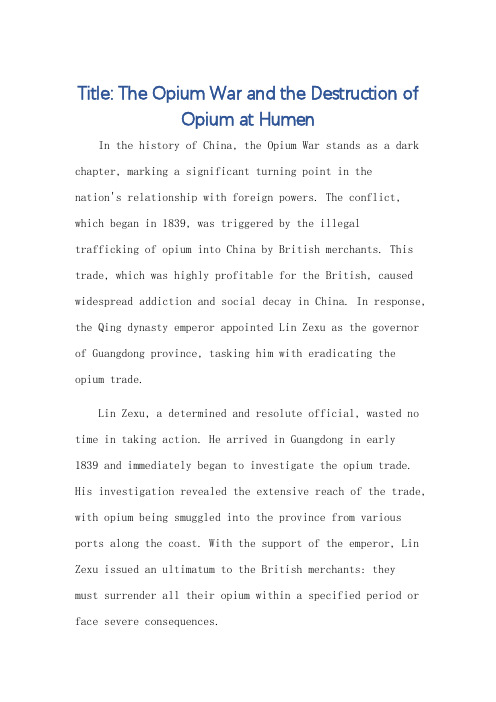
Title: The Opium War and the Destruction ofOpium at HumenIn the history of China, the Opium War stands as a dark chapter, marking a significant turning point in thenation's relationship with foreign powers. The conflict, which began in 1839, was triggered by the illegaltrafficking of opium into China by British merchants. This trade, which was highly profitable for the British, caused widespread addiction and social decay in China. In response, the Qing dynasty emperor appointed Lin Zexu as the governor of Guangdong province, tasking him with eradicating the opium trade.Lin Zexu, a determined and resolute official, wasted no time in taking action. He arrived in Guangdong in early1839 and immediately began to investigate the opium trade. His investigation revealed the extensive reach of the trade, with opium being smuggled into the province from various ports along the coast. With the support of the emperor, Lin Zexu issued an ultimatum to the British merchants: theymust surrender all their opium within a specified period or face severe consequences.The British merchants, however, refused to comply. This refusal only strengthened Lin Zexu's resolve, and on June 3, 1839, he ordered the destruction of the opium stockpiles. Over the course of 23 days, large quantities of opium were publicly destroyed, either by being burned or dumped into the sea. This destruction of opium at Humen marked a significant victory for China in its fight against theopium trade.The destruction of opium at Humen, however, was not the end of the conflict. The British government, angered by the action, sent a fleet to China, leading to the outbreak of the First Opium War in 1840. This war, which lasted for two years, ended in a humiliating defeat for China, resultingin the signing of the Treaty of Nanjing. The treaty forced China to cede Hong Kong to the British and opened upseveral ports for trade, effectively ending China's闭关锁国 policy.In hindsight, the destruction of opium at Humen was not just an act of defiance against foreign opium traffickers but also a symbol of China's struggle against foreign aggression and the desire to maintain its sovereignty anddignity. Lin Zexu's actions, although controversial and ultimately unsuccessful in preventing the war, are remembered today as a testament to his patriotism and courage.The Opium War and the destruction of opium at Humen are significant historical events that have shaped China's modern history. They serve as a reminder of the nation's past challenges and struggles, and they continue to inspire the Chinese people in their pursuit of nationalrejuvenation and prosperity.**虎门销烟:历史的抉择与英勇的抗争**在中国历史长河中,鸦片战争无疑是一个黑暗的篇章,它标志着中国与外国列强关系的一个重要转折点。
中英鸦片战争的历史背景与影响
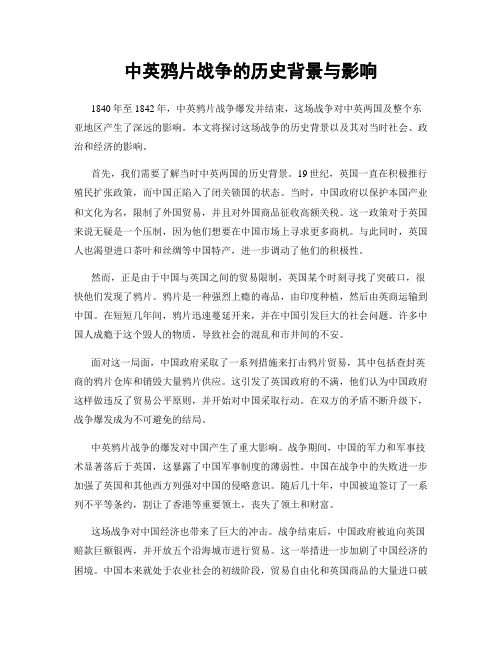
中英鸦片战争的历史背景与影响1840年至1842年,中英鸦片战争爆发并结束,这场战争对中英两国及整个东亚地区产生了深远的影响。
本文将探讨这场战争的历史背景以及其对当时社会、政治和经济的影响。
首先,我们需要了解当时中英两国的历史背景。
19世纪,英国一直在积极推行殖民扩张政策,而中国正陷入了闭关锁国的状态。
当时,中国政府以保护本国产业和文化为名,限制了外国贸易,并且对外国商品征收高额关税。
这一政策对于英国来说无疑是一个压制,因为他们想要在中国市场上寻求更多商机。
与此同时,英国人也渴望进口茶叶和丝绸等中国特产,进一步调动了他们的积极性。
然而,正是由于中国与英国之间的贸易限制,英国某个时刻寻找了突破口,很快他们发现了鸦片。
鸦片是一种强烈上瘾的毒品,由印度种植,然后由英商运输到中国。
在短短几年间,鸦片迅速蔓延开来,并在中国引发巨大的社会问题。
许多中国人成瘾于这个毁人的物质,导致社会的混乱和市井间的不安。
面对这一局面,中国政府采取了一系列措施来打击鸦片贸易,其中包括查封英商的鸦片仓库和销毁大量鸦片供应。
这引发了英国政府的不满,他们认为中国政府这样做违反了贸易公平原则,并开始对中国采取行动。
在双方的矛盾不断升级下,战争爆发成为不可避免的结局。
中英鸦片战争的爆发对中国产生了重大影响。
战争期间,中国的军力和军事技术显著落后于英国,这暴露了中国军事制度的薄弱性。
中国在战争中的失败进一步加强了英国和其他西方列强对中国的侵略意识。
随后几十年,中国被迫签订了一系列不平等条约,割让了香港等重要领土,丧失了领土和财富。
这场战争对中国经济也带来了巨大的冲击。
战争结束后,中国政府被迫向英国赔款巨额银两,并开放五个沿海城市进行贸易。
这一举措进一步加剧了中国经济的困境。
中国本来就处于农业社会的初级阶段,贸易自由化和英国商品的大量进口破坏了中国本土产业。
中国由此成为英国商品的大量消费市场,为英国提供了廉价原料,并进一步加强了英国对中国的控制。
关于鸦片战争的英语演讲稿
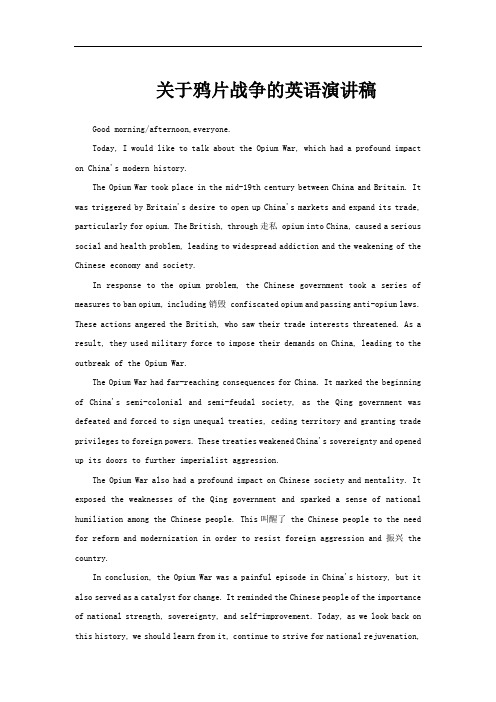
关于鸦片战争的英语演讲稿Good morning/afternoon,everyone.Today, I would like to talk about the Opium War, which had a profound impact on China's modern history.The Opium War took place in the mid-19th century between China and Britain. It was triggered by Britain's desire to open up China's markets and expand its trade, particularly for opium. The British, through走私 opium into China, caused a serious social and health problem, leading to widespread addiction and the weakening of the Chinese economy and society.In response to the opium problem, the Chinese government took a series of measures to ban opium, including销毁 confiscated opium and passing anti-opium laws. These actions angered the British, who saw their trade interests threatened. As a result, they used military force to impose their demands on China, leading to the outbreak of the Opium War.The Opium War had far-reaching consequences for China. It marked the beginning of China's semi-colonial and semi-feudal society, as the Qing government was defeated and forced to sign unequal treaties, ceding territory and granting trade privileges to foreign powers. These treaties weakened China's sovereignty and opened up its doors to further imperialist aggression.The Opium War also had a profound impact on Chinese society and mentality. It exposed the weaknesses of the Qing government and sparked a sense of national humiliation among the Chinese people. This叫醒了 the Chinese people to the need for reform and modernization in order to resist foreign aggression and振兴 the country.In conclusion, the Opium War was a painful episode in China's history, but it also served as a catalyst for change. It reminded the Chinese people of the importance of national strength, sovereignty, and self-improvement. Today, as we look back on this history, we should learn from it, continue to strive for national rejuvenation,and work towards a better future for our country.Thank you.。
鸦 片战 争英语作文
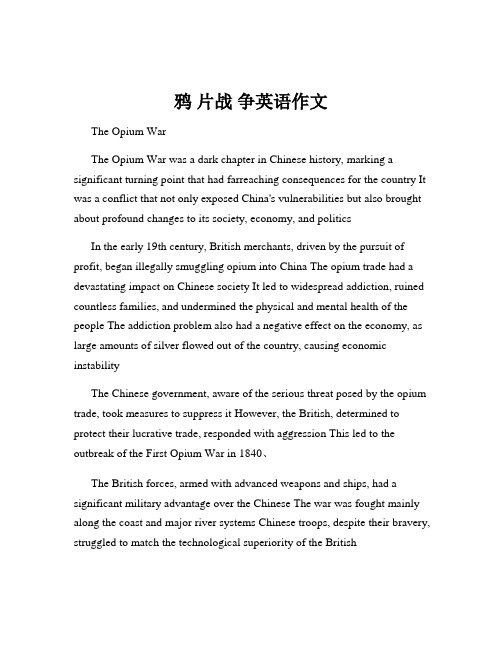
鸦片战争英语作文The Opium WarThe Opium War was a dark chapter in Chinese history, marking a significant turning point that had farreaching consequences for the country It was a conflict that not only exposed China's vulnerabilities but also brought about profound changes to its society, economy, and politicsIn the early 19th century, British merchants, driven by the pursuit of profit, began illegally smuggling opium into China The opium trade had a devastating impact on Chinese society It led to widespread addiction, ruined countless families, and undermined the physical and mental health of the people The addiction problem also had a negative effect on the economy, as large amounts of silver flowed out of the country, causing economic instabilityThe Chinese government, aware of the serious threat posed by the opium trade, took measures to suppress it However, the British, determined to protect their lucrative trade, responded with aggression This led to the outbreak of the First Opium War in 1840、The British forces, armed with advanced weapons and ships, had a significant military advantage over the Chinese The war was fought mainly along the coast and major river systems Chinese troops, despite their bravery, struggled to match the technological superiority of the BritishThe outcome of the war was a humiliating defeat for China The Treaty of Nanjing, signed in 1842, imposed heavy terms on China It included the cession of Hong Kong to the British, the opening of several ports for trade, and the payment of large indemnities This marked the beginning of China's transformation from an independent country to a semicolonial and semifeudal societyThe Opium War also had a profound impact on Chinese society and culture It shattered the sense of superiority that many Chinese held about their country and its civilization It sparked a wave of reflection and calls for reform among some intellectuals and officialsIn the long term, the Opium War served as a catalyst for various movements and changes in China It led to increased efforts to modernize the military and adopt Western technologies It also raised questions about the traditional political and social systems and laid the groundwork for the later reform movements and revolutionary upheavalsThe lessons of the Opium War are still relevant today It reminds us of the importance of maintaining national sovereignty and resisting external aggression It also highlights the need for continuous progress and adaptation to avoid falling behind in an increasingly competitive worldFurthermore, the Opium War should prompt us to reflect on the dangers of drug abuse and the importance of combating illegal drug trafficking We must safeguard the health and wellbeing of our society and prevent the recurrence of such tragediesIn conclusion, the Opium War was a painful and crucial event in Chinese history Its impact was wideranging and longlasting, shaping China's path inthe subsequent centuries We must study and understand this period to ensure that we learn from the past and strive for a better future。
关于鸦片战争的英语作文
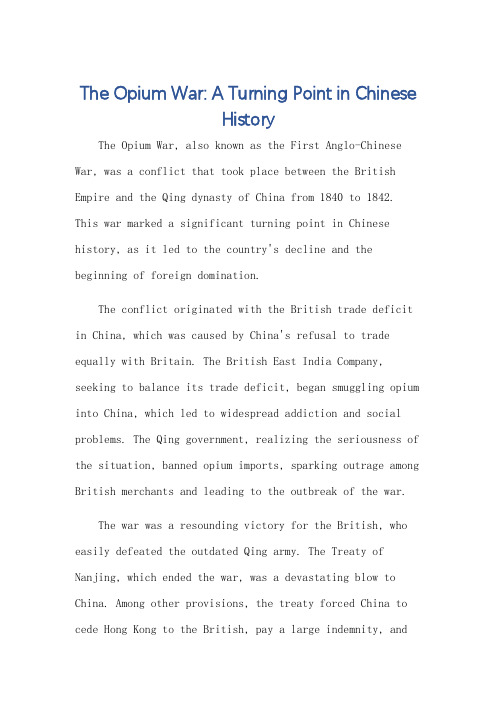
The Opium War: A Turning Point in ChineseHistoryThe Opium War, also known as the First Anglo-Chinese War, was a conflict that took place between the British Empire and the Qing dynasty of China from 1840 to 1842. This war marked a significant turning point in Chinese history, as it led to the country's decline and the beginning of foreign domination.The conflict originated with the British trade deficit in China, which was caused by China's refusal to trade equally with Britain. The British East India Company, seeking to balance its trade deficit, began smuggling opium into China, which led to widespread addiction and social problems. The Qing government, realizing the seriousness of the situation, banned opium imports, sparking outrage among British merchants and leading to the outbreak of the war. The war was a resounding victory for the British, who easily defeated the outdated Qing army. The Treaty of Nanjing, which ended the war, was a devastating blow to China. Among other provisions, the treaty forced China to cede Hong Kong to the British, pay a large indemnity, andgrant additional extraterritorial rights to the British. These terms effectively stripped China of its sovereignty and laid the groundwork for future foreign invasions and occupations.The Opium War had profound impacts on Chinese society and politics. It marked the beginning of China's decline as a global power and the start of a period of foreign domination and exploitation. The treaty provisions, particularly the cession of Hong Kong, became symbols of national humiliation and sparked a wave of reform movements and nationalistic sentiment that would shape China'shistory for decades.The war also exposed the deep-seated problems within the Qing dynasty. The dynasty's outdated military and administrative systems, combined with corruption and incompetence among its leaders, made it unable to respond effectively to the challenges posed by foreign powers. The Opium War thus became a catalyst for social and political change in China, leading to the eventual collapse of the Qing dynasty and the emergence of new political forces that would shape the country's future.In conclusion, the Opium War was a tragic chapter in Chinese history that marked the beginning of a long periodof foreign domination and national humiliation. It was a wake-up call for the Chinese people, who realized that they needed to modernize their country in order to compete with the powerful foreign powers. The lessons learned from this war have had a profound impact on Chinese society and politics, shaping the country's development andinternational standing in the modern era.**鸦片战争:中国历史的转折点**鸦片战争,也被称为第一次英中战争,是1840年至1842年间英国帝国与清朝中国之间发生的一场冲突。
鸦片战争论文

鸦片战争论文简介鸦片战争(1839-1842年)是中国近代史上的一次重大历史事件,标志着中国的半封建半殖民地社会的彻底崩溃,也为中国的近代化进程带来了深远的影响。
本文将对鸦片战争的原因、影响和启示进行探讨。
一、鸦片战争的原因1. 英国的贸易需求鸦片战争的爆发与英国的贸易需求密切相关。
当时,英国工业革命的推进使得英国的工业生产能力大幅增强,但市场需求有限。
为了缓解内部压力,英国开始寻求海外市场,并将目光转向中国。
2. 鸦片贸易的兴盛与中国政府的禁烟令在这一背景下,鸦片作为一种商品逐渐流入中国市场。
然而,鸦片的流入严重破坏了中国社会的社会秩序和人民的健康,造成了中国人民的苦痛。
为了应对这一问题,中国政府出台了禁烟令,以期限制和禁止鸦片的流通。
3. 英国的军事干预不满中国政府的禁烟令,英国发动了鸦片战争,以保护其在中国的鸦片贸易利益。
通过武力手段,英国迫使中国签订了《南京条约》,对中国进行了不平等的践踏。
二、鸦片战争的影响1. 不平等条约的签订鸦片战争以中国签订《南京条约》的方式结束。
该条约规定,中国割让香港、开放五个港口对外贸易,且要向英国支付巨额赔款。
此后,中国签订了一系列不平等的条约,削弱了中国的主权地位,使中国成为殖民地和半殖民地国家。
2. 社会动荡与变革鸦片战争的爆发对中国社会产生了极大的冲击,引起了中国社会的不稳。
随着中国社会的动荡和变革,一系列的历史事件相继出现,如太平天国运动和义和团运动,进一步削弱了中国的统治地位。
3. 东西方思想的碰撞鸦片战争对中国的思想界产生了巨大的冲击,推动了中国近代思想的转变。
传统的封建思想开始受到质疑,西方的强大给中国思想界带来了触动,众多的思想家开始思考如何拯救中国。
这一时期,出现了众多的新思潮,如洋务运动、戊戌变法等。
三、鸦片战争的启示1. 改革自强鸦片战争的失败使中国人深刻认识到中国的薄弱和国家的不堪,从而推动了一系列的改革措施,如洋务运动和戊戌变法。
虎门销烟英语作文
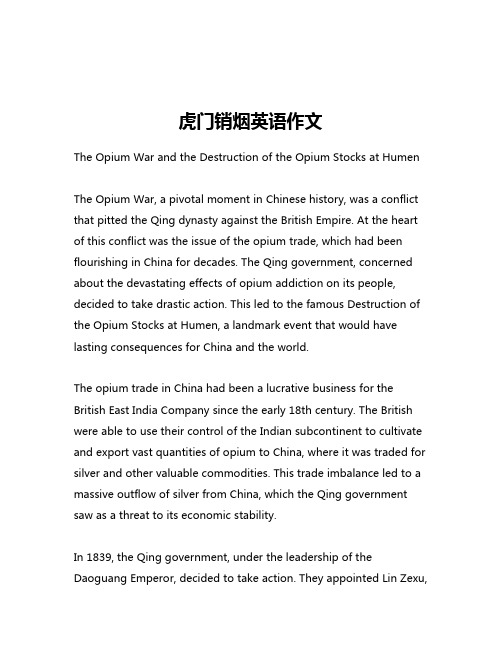
虎门销烟英语作文The Opium War and the Destruction of the Opium Stocks at HumenThe Opium War, a pivotal moment in Chinese history, was a conflict that pitted the Qing dynasty against the British Empire. At the heart of this conflict was the issue of the opium trade, which had been flourishing in China for decades. The Qing government, concerned about the devastating effects of opium addiction on its people, decided to take drastic action. This led to the famous Destruction of the Opium Stocks at Humen, a landmark event that would have lasting consequences for China and the world.The opium trade in China had been a lucrative business for the British East India Company since the early 18th century. The British were able to use their control of the Indian subcontinent to cultivate and export vast quantities of opium to China, where it was traded for silver and other valuable commodities. This trade imbalance led to a massive outflow of silver from China, which the Qing government saw as a threat to its economic stability.In 1839, the Qing government, under the leadership of the Daoguang Emperor, decided to take action. They appointed Lin Zexu,a renowned scholar and government official, to oversee the suppression of the opium trade. Lin Zexu arrived in the city of Guangzhou (then known as Canton) and immediately set about enforcing the Qing's anti-opium policies.Lin Zexu's first step was to demand that all foreign merchants surrender their opium stocks. The British merchants, led by the East India Company, initially refused, but Lin Zexu was unwavering in his resolve. He blockaded the foreign merchants in their factories, cut off their supplies, and threatened to use force if they did not comply.Faced with this ultimatum, the British merchants had no choice but to surrender their opium stocks. Over the course of several weeks, Lin Zexu's men confiscated and destroyed a staggering 20,000 chests of opium, worth an estimated 9 million silver dollars at the time.The Destruction of the Opium Stocks at Humen was a monumental event, both in terms of its scale and its symbolic significance. For the Qing government, it represented a bold and decisive stand against the scourge of opium addiction that had plagued China for decades. It was a clear message to the British that the Qing were not willing to tolerate the continued exploitation of their people and their resources.However, the British saw the destruction of the opium stocks as agrave affront to their commercial interests and national pride. They responded by sending a naval force to China, initiating the First Opium War. The war, which lasted from 1839 to 1842, ultimately ended in a decisive victory for the British. The Qing were forced to cede the island of Hong Kong to the British, pay a massive indemnity, and open up additional ports to foreign trade.The Opium War and the Destruction of the Opium Stocks at Humen had far-reaching consequences for China. The defeat of the Qing exposed the weaknesses of the imperial system and set the stage for the gradual decline of the dynasty. It also marked the beginning of a period of foreign domination and exploitation, known as the "Century of Humiliation," which would shape China's national psyche for generations to come.Despite the ultimate failure of the Qing's efforts to suppress the opium trade, the Destruction of the Opium Stocks at Humen remains a powerful symbol of China's resistance to foreign aggression and its determination to protect the well-being of its people. It is a testament to the courage and conviction of Lin Zexu and the Qing government, who were willing to risk everything to defend the sovereignty and integrity of their nation.In the years that followed, the legacy of the Opium War and the Destruction of the Opium Stocks at Humen would continue to shapethe course of Chinese history. It would inspire future generations of Chinese leaders to stand up to foreign powers and fight for the country's independence and development. And it would serve as a reminder of the enduring spirit of the Chinese people, who have time and again proven their resilience in the face of adversity.。
关于鸦片战争的英语作文
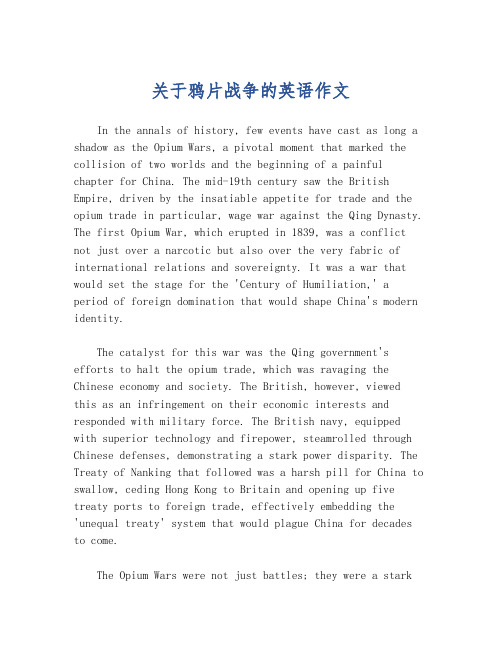
关于鸦片战争的英语作文In the annals of history, few events have cast as long a shadow as the Opium Wars, a pivotal moment that marked the collision of two worlds and the beginning of a painful chapter for China. The mid-19th century saw the British Empire, driven by the insatiable appetite for trade and the opium trade in particular, wage war against the Qing Dynasty. The first Opium War, which erupted in 1839, was a conflict not just over a narcotic but also over the very fabric of international relations and sovereignty. It was a war that would set the stage for the 'Century of Humiliation,' a period of foreign domination that would shape China's modern identity.The catalyst for this war was the Qing government's efforts to halt the opium trade, which was ravaging the Chinese economy and society. The British, however, viewedthis as an infringement on their economic interests and responded with military force. The British navy, equipped with superior technology and firepower, steamrolled through Chinese defenses, demonstrating a stark power disparity. The Treaty of Nanking that followed was a harsh pill for China to swallow, ceding Hong Kong to Britain and opening up five treaty ports to foreign trade, effectively embedding the'unequal treaty' system that would plague China for decades to come.The Opium Wars were not just battles; they were a starkreminder of the consequences of the global power dynamics and the imperative for nations to modernize. For China, it was a wake-up call to the urgent need for reform and the dangers of isolationism. The wars sparked a period of introspection and resistance, leading to the rise of various movements aimed at strengthening China against foreign encroachment.The legacy of the Opium Wars is complex and multifaceted. It represents a dark period of exploitation but also a catalyst for change. It is a testament to the resilience of the Chinese people and their enduring spirit in the face of adversity. As we reflect on this historical episode, it serves as a poignant reminder of the interconnectedness of our world and the enduring quest for justice and equality in international relations.。
鸦片战争的历史及影响(英语论文)
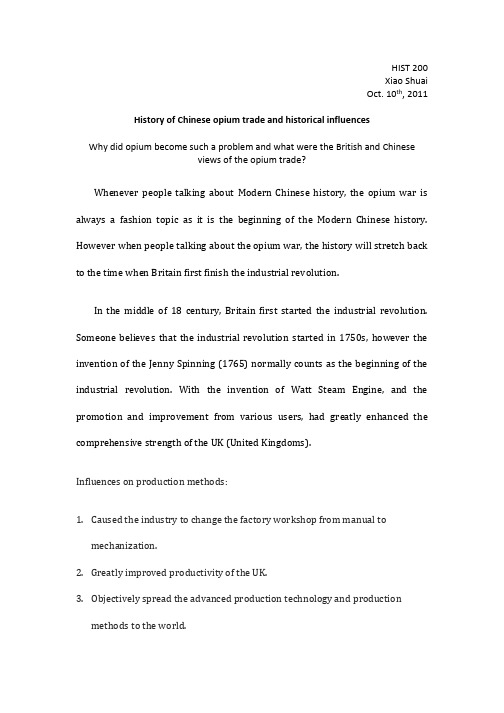
HIST 200Xiao ShuaiOct. 10th, 2011 History of Chinese opium trade and historical influences Why did opium become such a problem and what were the British and Chineseviews of the opium trade?Whenever people talking about Modern Chinese history, the opium war is always a fashion topic as it is the beginning of the Modern Chinese history. However when people talking about the opium war, the history will stretch back to the time when Britain first finish the industrial revolution.In the middle of 18 century, Britain first started the industrial revolution. Someone believes that the industrial revolution started in 1750s, however the invention of the Jenny Spinning (1765) normally counts as the beginning of the industrial revolution. With the invention of Watt Steam Engine, and the promotion and improvement from various users, had greatly enhanced the comprehensive strength of the UK (United Kingdoms).Influences on production methods:1.Caused the industry to change the factory workshop from manual tomechanization.2.Greatly improved productivity of the UK.3.Objectively spread the advanced production technology and productionmethods to the world.4.The UK had begun dumping commodities to overseas markets as the “worldfactory”.Based on the advantages of technologies, British had started dumping their commodities to oversea markets. To satisfy the demand of Chinese commodities of Europe, East India Co. and other western mechanists using industrial products trade Chinese commodities to European market such as tea, silks and ceramics. According to the text book, in 1600 the British government granted the east India company a monopoly on trade east of Africa’s cape of good hope to south America’s straits of Magellan, that is, all trade in the Indian and pacific ocean; made perpetual in 1609, this monopoly lasted until 1834. There were 4 opened ports at China in early 18 century; the Canton system was the procedure of trade and barbarian management. The ports reduced to only one in 1759. James Flint has sent to undertake talk about restrict trading policies with Qing government by East India Co., had violated Chinese policies, the court decreed that Canton from that time would be only open port and that Europeans could trade only with the Cohong under the general control of a Superintendent of Maritime Customs.As the time goes by, the limited ports of Chinese market and the Canton system could no longer satisfy the booming trades and western demand of Chinese goods. By the turn of the 19-century, tea made up 80% of Chinese exports to Europe. Therefore western merchants wants further open up themarket to them. According to the textbook, in 1793, the British east India company sent lord George McCartney to try to expand trading privileges, open more trading port, and establish diplomatic residence. But the Qianlong treated the effort as a tributary mission, and there were no changes in Chinese policy. An 1816 follow-up mission, led by lord William Amherst, was not even formally received.By the time Britain and other European countries had entered the Industrial Age. China, a historical country that remained over 2000 years’ feudal society, was still an undeveloped agriculture-lead-economy country. Chinese and their society were pretty satisfied with their out-of-fashion natural economy. When China lost curiosity of western commodities, Chinese and the market basically lost the demand of western industrial goods, British, mainly the East India Co., have to use silver to trade Chinese commodities, which will reduce a large amount of profits. To balance the huge merchandise trade deficit and save the result of running out of silver reserves, as well as to satisfy demand of Chinese tea, British decided to trade more opium to China. The East India Co. had started using opium to trade Chinese commodities instead of silver since the end of 18 century: Tones and tones of opium transfer from India to Chinese society via Chinese coastal region. As opium trade increasing every year, Chinese silver reserves was rapidly losing year by year, which directly lead to a huge decreasing of Chinese comprehensive strength. A huge number of Chinese populations indicted to opium, including soldiers and administration officials. Qinggovernment was getting more and more corrupt and powerless, as well as military force. The opium trade had indirectly exacerbated Qing dynasty’s subversion.Why did the two sides go to war and how did this conflict influence subsequenthistory?When time goes into 1830s, Daoguang emperor finally chose to support the officials’ anti-opium faction represented by Lin Zexu after awarded the great harm of continuing opium trade. In 1839, Daoguang emperor appointed Lin as imperial commissioner to wipe out opium trade. In the very beginning of Lin’s actions, he tried to demand foreigners turn over their opium stock. However, “the British first ignored the order, then refused.” Lin then stopped all trade and started destroy all the opium he could possibly find. In the whole period of anti-opium movement, Lin had arrested approximately 1,700 Chinese, 350 foreigners and successfully destroyed 44,000 pounds of opium. British felt that the lost during the movement was intolerable. According to textbook, British treated the siege and the seizure of opium as a national affront and a cause for war. In 1834, the UK government had taken back the permission of monopoly trade to Chinese market from East India Co. The behaviors in anti-opium movement had seriously damaged the profits of the UK government.In August 1842, the first Opium War was ended with disastrous defeat of China. British authority forced Qing government to sign the first unequal treatyin modern history "Treaty of Nanjing ", and later the Qing government signed "Trea ty of Wanghia" and "Treaty of Whampoa" with United States and France respectively.Since then, China’s history has undergone major changes.The sovereignty and territorial integrity was destroyed, the path of independent development was interrupted, and China was forced to enter into the capitalist world market. Before the Opium War, China was an independent feudal state, and the Qing governm ent exercised full dominion; after the war, part of China’s sovereignty was subject to severe destruction. Chinese self-sufficient natural economy began to disintegrate. Before the war, in terms of economy, China was a feudal country based on natural economy, and individual farming was combined with cottage industry, strongly rejecting the aggression of foreign goods. After the war, "Canton system" was abolished, treading ports were increased, the tariff sovereignty was lost, and foreign cheap goods poured into China, therefore Chinese self-sufficient feudal economy was gradually smashed and China increasingly descended to commodity market and raw materials supplier of imperialism. As massive amount of silver flowed out, the Qing government's financial management was influenced, so the working people's lives became more difficult.After the Opium War, signatory country got extraterritoriality and consular jurisdiction. Extraterritoriality stipulates that although foreign monarchs, headsof state, diplomats, and persons and houses with diplomatic privileges are in the territory of the country, under the law they are not belong to the country, and thus they are not subject to local laws. Consular jurisdiction stipulates that by treaty a state should give the tra ding privileges to the other state’s citizens who are living in the state concerned, especially give immunity from the jurisdiction of local courts and privileges of jurisdiction that the local courts exercised.Extraterritoriality and consular jurisdiction were legalized in the unequal treaties, so foreign concessions began to appear in China. Nominally, the territory of foreign concessions belongs to leaser nation without the property of extraterritoriality. But in the history, all the user nations of the concessions made use of unequal treaties to obtain citizen’s consular jurisdiction. The administrative autonomy of foreign concessions limited the leaser country to executive power in its region, and a few concessions had legislative authority. The host c ountry of concession’s territorial sovereignty treated the concession as the foreign territory and dared not to interfere in its internal affairs. Therefore, it is difficult to conduct jurisdiction on activities happened in the concession.Opium War is an important turning point in Chinese history, since then China ended its feudal society and began to step into a semi-feudal society, which marks the beginning of Chinese modern history.。
鸦片战争英语作文
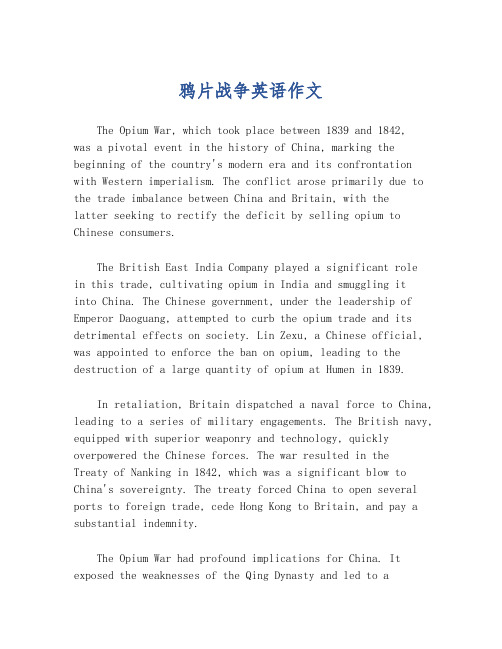
鸦片战争英语作文The Opium War, which took place between 1839 and 1842,was a pivotal event in the history of China, marking the beginning of the country's modern era and its confrontation with Western imperialism. The conflict arose primarily due to the trade imbalance between China and Britain, with thelatter seeking to rectify the deficit by selling opium to Chinese consumers.The British East India Company played a significant rolein this trade, cultivating opium in India and smuggling itinto China. The Chinese government, under the leadership of Emperor Daoguang, attempted to curb the opium trade and its detrimental effects on society. Lin Zexu, a Chinese official, was appointed to enforce the ban on opium, leading to the destruction of a large quantity of opium at Humen in 1839.In retaliation, Britain dispatched a naval force to China, leading to a series of military engagements. The British navy, equipped with superior weaponry and technology, quickly overpowered the Chinese forces. The war resulted in theTreaty of Nanking in 1842, which was a significant blow to China's sovereignty. The treaty forced China to open several ports to foreign trade, cede Hong Kong to Britain, and pay a substantial indemnity.The Opium War had profound implications for China. It exposed the weaknesses of the Qing Dynasty and led to aperiod of internal turmoil and external pressures known as the Century of Humiliation. The war also marked the beginning of China's engagement with the global community, albeit under unfavorable terms.In the aftermath, China faced numerous challenges, including additional unequal treaties with other Western powers. These events sparked a desire for reform and modernization within China, eventually leading to the fall of the Qing Dynasty and the establishment of the Republic of China.The Opium War serves as a reminder of the consequences of unequal power dynamics in international relations and the importance of national sovereignty and self-determination. It is a historical episode that continues to shape China's approach to foreign policy and its quest for a more just and equitable global order.。
虎门销烟给我的感受英语作文
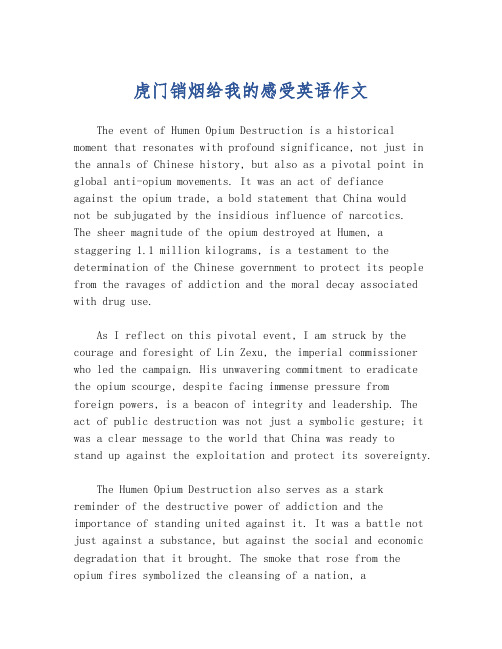
虎门销烟给我的感受英语作文The event of Humen Opium Destruction is a historical moment that resonates with profound significance, not just in the annals of Chinese history, but also as a pivotal point in global anti-opium movements. It was an act of defianceagainst the opium trade, a bold statement that China wouldnot be subjugated by the insidious influence of narcotics.The sheer magnitude of the opium destroyed at Humen, a staggering 1.1 million kilograms, is a testament to the determination of the Chinese government to protect its people from the ravages of addiction and the moral decay associated with drug use.As I reflect on this pivotal event, I am struck by the courage and foresight of Lin Zexu, the imperial commissioner who led the campaign. His unwavering commitment to eradicate the opium scourge, despite facing immense pressure fromforeign powers, is a beacon of integrity and leadership. The act of public destruction was not just a symbolic gesture; it was a clear message to the world that China was ready tostand up against the exploitation and protect its sovereignty.The Humen Opium Destruction also serves as a stark reminder of the destructive power of addiction and the importance of standing united against it. It was a battle not just against a substance, but against the social and economic degradation that it brought. The smoke that rose from the opium fires symbolized the cleansing of a nation, acollective effort to purify and rebuild a society marred by the opium trade.This event, while rooted in the past, continues toinspire and challenge us today. It is a call to action for us to remain vigilant against the dangers of drug abuse and to uphold the values of health, well-being, and social responsibility. The legacy of Humen is not just a chapter in history; it is a timeless lesson on the power of collective will and the indomitable spirit of a people determined to reclaim their destiny.。
维多利亚女王和鸦片战争
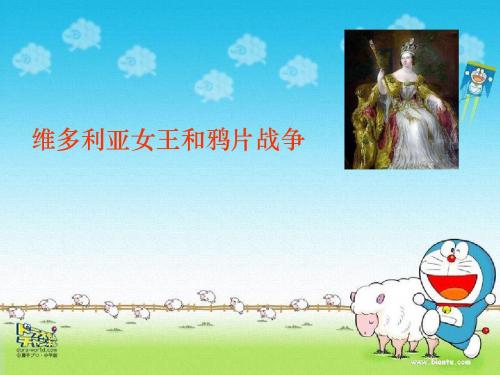
The Trade with China British’s trade with China began with tea, silk; these are luxury goods on the British market, while China’s self-sufficient economic system makes the British’s product useless. In order to reverse the trade deficit with China, British merchants began dumping the opium with the support of British Government.
中国市场的开放以 及赔款大大促进了 大英帝国的发展
维多利亚女王和鸦片战争
背Hale Waihona Puke :When Queen Victoria ascended the throne in 1837, the United Kingdom has completed the capitalist industrial revolution, To search for raw materials to meet the national requirements and the sales market, the British began to establish colonies and dominions all over the world and trade with them.
1840年6月,维多利亚女王派遣 英军总司令懿律率舰只40余艘、 士兵4000多名,于 6月28日到达 中国南海海面,封锁珠江。第一 次鸦片战争正式爆发。
史纲论文-鸦片战争

中国近代史开端——鸦片战争摘要:从1840年到1860到,西方列强先后对中国发动两次鸦片战争,强迫清政府签下一系列不平等条约。
中国开始沦为半殖民地半封建社会。
本论文提到了鸦片战争的背景,仔细说明了两次鸦片战争的过程,讨论了鸦片战争对中国的影响、危害及客观进步性。
关键词:鸦片战争;背景;进程;影响;危害;客观进步性引言:鸦片战争(Sino-British Opium War),中国近代史上一共有两次鸦片战争:第一次鸦片战争:1840年6月~1842年8月;第二次鸦片战争:1856年10月~1860年10月。
两次鸦片战争使旧中国逐步沦为半封建半殖民地社会。
一、鸦片战争的背景19世纪上半期欧美资本主义正处于上升阶段,英国工业革命已经完成,法、美工业革命也正在迅猛发展。
工业资本主义生产的存在和发展,需要不断开辟新的商品市场和原料产地。
而此时的清王朝依旧做着“天朝上国”的迷梦,清王朝统治集团虚骄自大,闭目塞听,对世界形势茫然无知。
清政府仍旧推行闭关锁国的外交政策,中国依然是自给自足的自然经济,在正当的中英贸易中中国处于出超地位。
当时的英国政府已感到在中国这个封闭了几千年的古老大国,单靠贸易手段是不能解决问题的,为了扭转对华贸易逆差,英国无耻地向中国输入鸦片,鸦片严重危害到清政府的统治,道光帝任命林则徐禁烟,但林则徐的禁烟运动却成为英国政府使用“炮舰政策”的借口。
为了打开中国的大门,1840年英国悍然发动了侵略中国的鸦片战争。
二、两次鸦片战争中国近代史的开端,是以发生在清道光二十年至二十二年(1840-1842年)的鸦片战争为标志,同时这也是中国半殖民地半封建社会和旧民主主义革命时期的开端。
第一次鸦片战争前的鸦片走私贸易,让接连遭受1825年和1837年经济危机的大英帝国尝到了不小的甜头,源源不断地白银流入大英帝国的国库,正如梭伦所说:“财富催生饱腻,饱腻催生暴行”,大英帝国迫不及待的将侵略的坐标插入了中国的版图之上。
- 1、下载文档前请自行甄别文档内容的完整性,平台不提供额外的编辑、内容补充、找答案等附加服务。
- 2、"仅部分预览"的文档,不可在线预览部分如存在完整性等问题,可反馈申请退款(可完整预览的文档不适用该条件!)。
- 3、如文档侵犯您的权益,请联系客服反馈,我们会尽快为您处理(人工客服工作时间:9:00-18:30)。
HIST 200Xiao ShuaiOct. 10th, 2011 History of Chinese opium trade and historical influences Why did opium become such a problem and what were the British and Chineseviews of the opium trade?Whenever people talking about Modern Chinese history, the opium war is always a fashion topic as it is the beginning of the Modern Chinese history. However when people talking about the opium war, the history will stretch back to the time when Britain first finish the industrial revolution.In the middle of 18 century, Britain first started the industrial revolution. Someone believes that the industrial revolution started in 1750s, however the invention of the Jenny Spinning (1765) normally counts as the beginning of the industrial revolution. With the invention of Watt Steam Engine, and the promotion and improvement from various users, had greatly enhanced the comprehensive strength of the UK (United Kingdoms).Influences on production methods:1.Caused the industry to change the factory workshop from manual tomechanization.2.Greatly improved productivity of the UK.3.Objectively spread the advanced production technology and productionmethods to the world.4.The UK had begun dumping commodities to overseas markets as the “worldfactory”.Based on the advantages of technologies, British had started dumping their commodities to oversea markets. To satisfy the demand of Chinese commodities of Europe, East India Co. and other western mechanists using industrial products trade Chinese commodities to European market such as tea, silks and ceramics. According to the text book, in 1600 the British government granted the east India company a monopoly on trade east of Africa’s cape of good hope to south America’s straits of Magellan, that is, all trade in the Indian and pacific ocean; made perpetual in 1609, this monopoly lasted until 1834. There were 4 opened ports at China in early 18 century; the Canton system was the procedure of trade and barbarian management. The ports reduced to only one in 1759. James Flint has sent to undertake talk about restrict trading policies with Qing government by East India Co., had violated Chinese policies, the court decreed that Canton from that time would be only open port and that Europeans could trade only with the Cohong under the general control of a Superintendent of Maritime Customs.As the time goes by, the limited ports of Chinese market and the Canton system could no longer satisfy the booming trades and western demand of Chinese goods. By the turn of the 19-century, tea made up 80% of Chinese exports to Europe. Therefore western merchants wants further open up themarket to them. According to the textbook, in 1793, the British east India company sent lord George McCartney to try to expand trading privileges, open more trading port, and establish diplomatic residence. But the Qianlong treated the effort as a tributary mission, and there were no changes in Chinese policy. An 1816 follow-up mission, led by lord William Amherst, was not even formally received.By the time Britain and other European countries had entered the Industrial Age. China, a historical country that remained over 2000 years’ feudal society, was still an undeveloped agriculture-lead-economy country. Chinese and their society were pretty satisfied with their out-of-fashion natural economy. When China lost curiosity of western commodities, Chinese and the market basically lost the demand of western industrial goods, British, mainly the East India Co., have to use silver to trade Chinese commodities, which will reduce a large amount of profits. To balance the huge merchandise trade deficit and save the result of running out of silver reserves, as well as to satisfy demand of Chinese tea, British decided to trade more opium to China. The East India Co. had started using opium to trade Chinese commodities instead of silver since the end of 18 century: Tones and tones of opium transfer from India to Chinese society via Chinese coastal region. As opium trade increasing every year, Chinese silver reserves was rapidly losing year by year, which directly lead to a huge decreasing of Chinese comprehensive strength. A huge number of Chinese populations indicted to opium, including soldiers and administration officials. Qinggovernment was getting more and more corrupt and powerless, as well as military force. The opium trade had indirectly exacerbated Qing dynasty’s subversion.Why did the two sides go to war and how did this conflict influence subsequenthistory?When time goes into 1830s, Daoguang emperor finally chose to support the officials’ anti-opium faction represented by Lin Zexu after awarded the great harm of continuing opium trade. In 1839, Daoguang emperor appointed Lin as imperial commissioner to wipe out opium trade. In the very beginning of Lin’s actions, he tried to demand foreigners turn over their opium stock. However, “the British first ignored the order, then refused.” Lin then stopped all trade and started destroy all the opium he could possibly find. In the whole period of anti-opium movement, Lin had arrested approximately 1,700 Chinese, 350 foreigners and successfully destroyed 44,000 pounds of opium. British felt that the lost during the movement was intolerable. According to textbook, British treated the siege and the seizure of opium as a national affront and a cause for war. In 1834, the UK government had taken back the permission of monopoly trade to Chinese market from East India Co. The behaviors in anti-opium movement had seriously damaged the profits of the UK government.In August 1842, the first Opium War was ended with disastrous defeat of China. British authority forced Qing government to sign the first unequal treatyin modern history "Treaty of Nanjing ", and later the Qing government signed "Trea ty of Wanghia" and "Treaty of Whampoa" with United States and France respectively.Since then, China’s history has undergone major changes.The sovereignty and territorial integrity was destroyed, the path of independent development was interrupted, and China was forced to enter into the capitalist world market. Before the Opium War, China was an independent feudal state, and the Qing governm ent exercised full dominion; after the war, part of China’s sovereignty was subject to severe destruction. Chinese self-sufficient natural economy began to disintegrate. Before the war, in terms of economy, China was a feudal country based on natural economy, and individual farming was combined with cottage industry, strongly rejecting the aggression of foreign goods. After the war, "Canton system" was abolished, treading ports were increased, the tariff sovereignty was lost, and foreign cheap goods poured into China, therefore Chinese self-sufficient feudal economy was gradually smashed and China increasingly descended to commodity market and raw materials supplier of imperialism. As massive amount of silver flowed out, the Qing government's financial management was influenced, so the working people's lives became more difficult.After the Opium War, signatory country got extraterritoriality and consular jurisdiction. Extraterritoriality stipulates that although foreign monarchs, headsof state, diplomats, and persons and houses with diplomatic privileges are in the territory of the country, under the law they are not belong to the country, and thus they are not subject to local laws. Consular jurisdiction stipulates that by treaty a state should give the tra ding privileges to the other state’s citizens who are living in the state concerned, especially give immunity from the jurisdiction of local courts and privileges of jurisdiction that the local courts exercised.Extraterritoriality and consular jurisdiction were legalized in the unequal treaties, so foreign concessions began to appear in China. Nominally, the territory of foreign concessions belongs to leaser nation without the property of extraterritoriality. But in the history, all the user nations of the concessions made use of unequal treaties to obtain citizen’s consular jurisdiction. The administrative autonomy of foreign concessions limited the leaser country to executive power in its region, and a few concessions had legislative authority. The host c ountry of concession’s territorial sovereignty treated the concession as the foreign territory and dared not to interfere in its internal affairs. Therefore, it is difficult to conduct jurisdiction on activities happened in the concession.Opium War is an important turning point in Chinese history, since then China ended its feudal society and began to step into a semi-feudal society, which marks the beginning of Chinese modern history.。
